 |
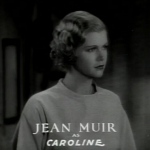 |
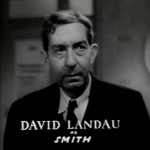 |
| Bob Brown Warren William |
Caroline Jean Muir |
John Smith David Landau |
| Released by Warner Brothers | Directed By Robert Florey |
||
Proof That It’s Pre-Code
- The film’s opening shot, before it’s revealed to be an innocent examination (but still with plenty of pointed jokes about it):
- “You said you were bringing her up here for luck. And it looks as though you got lucky.”
- A man walks into a doctor’s office demanding a morphine shot for his asthma. Turns out he’s a former doctor who’s become an addict. Our lead characters have a good chuckle about it.
- Oh, and our lead character keeps supplying him with morphine.
- And he impersonates a doctor and risks people’s lives for fame.
- And, at one point in this movie, Warren William raises the dead.
Bedside: A Stiff Demeanor
“It won’t hurt, will it?”
“No. In fact, most people enjoy Mr. Brown’s technique…”
Warren William is an actor that’s hard to resist. The tall, mustached charmer specialized in heels with a heart of gold– and usually the gold remained the important part of the equation. He specialized in playing cads with a wry wit and the right words which always led someone into trouble. Bedside (whose title would seem to have two meanings based on both Bob’s career as a fake doctor and his relationships with women) is not one of his better roles. In fact, many pieces are borrowed wholesale from other movies, including a number of William’s own vehicles.
The story is pretty simple. Bob Brown is a scoundrel and, worse, an incompetent one. He flunked out of medical school thanks to women and booze but still trumpets how he made it to his third year. However, he also has a way with the ladies, including nurse Caroline. She decides to fund his last year of medical school because she’s so self sacrificing and so dedicated that she simply must do it. Brown, of course, blows his entire tuition in a poker game on the train there.
Brown, not wanting to disappoint Carolyn, opts instead to buy a degree from a doctor (now calling himself John Smith) who’s become addicted to morphine. Brown scurries to New York under his new name and hits it big. Hiring a publicity man and pegging a few cons, his name is soon bandied about in the highest of social circles.
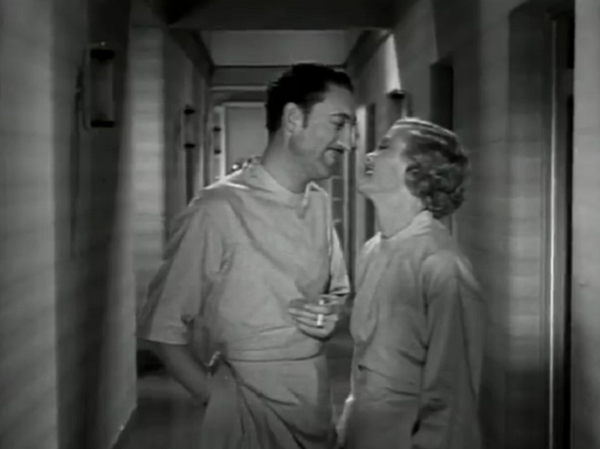
Stand by your conman.
Caroline follows closely behind and quickly buys into his new practice, even if he hires an efficient man named Dr. Wiley (Donald Meek) to do all of the real medical work. This leaves Brown plenty of time to make money and spend it lavishly, as well as seduce an unsuspecting opera singer. Caroline eventually catches on that Brown has been faking everything after the ‘doctor’ is forced to actually perform a surgery that goes disastrously wrong and must resort to using Wiley’s odd ‘resurrect the dead’ hobby to its fullest extent. To make things worse, Smith keeps popping up, taunting Brown until he’s finally at his wit’s end.
Bedside has a lot of familiar elements from a host of Warner Brothers films, not the least of which is its supporting cast. Louise Beavers is stuck in an embarrassing role as a vain dry cleaner. Allen Jenkins, as an unscrupulous press agent, is barely given anything to chew on. Donald Meek, as a nerdy, competent doctor who just so happens to dabble in resurrection, is fun to watch as a particularly odd kind of duck.
But the most interesting thing about Bedside would have to be David Landau as John Smith. Landau usually excels at playing noble gentleman or tough, no-nonsense guys. Seeing him let loose as an addict with a very dark, frantic edge is fun. And Smith, like the main character of Heroes for Sale, is an addict who’s not judged for what he is. In both films it’s obvious that the addiction was initially unwilling before becoming necessary, and the both films pity the men who’ve been left to hang out to dry by society. As nasty and smarmy as Smith can be in this film, most of it is a result from Brown’s manipulations; Brown takes his name and his accomplishments with a big smile and a promise of more morphine. Brown seems here to be another representation of society as a whole, taking from those that can’t protect themselves and exploiting their vulnerabilities. And Landau’s face popping up, mocking Brown for his decision to resurrect the dead, is also a weird, singular treat in a movie full of leftovers.
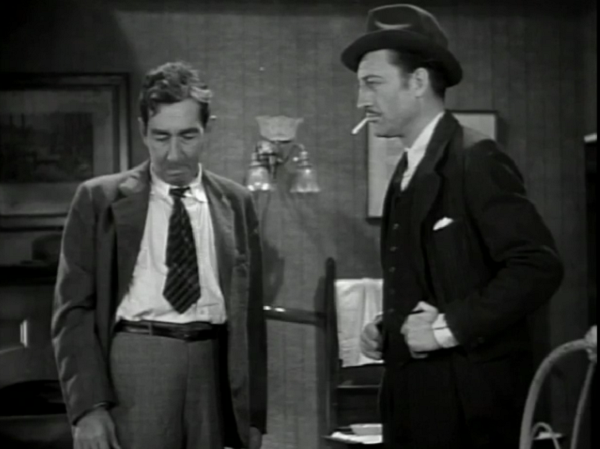
“I’m going to take the only thing you have left, and you’re gonna like it!”
Spoilers.
Less interesting about the film has to be the female protagonist, Caroline. Portrayed as a courageous, brave woman who only wanted to exalt her man, Caroline still comes across as rock stupid. She develops a glow just from being around Brown, and though she often notices how he avoids doing any work or hits on every single one of the female patients, she still thinks investing $1500 in his life and career can only go well. She often ignores all of the warning signs of his incompetence, and when she finally gets the proof that he’s operating on people without sufficient training, she walks out. Mind you, she doesn’t do anything to help mitigate his reign of terror on unsuspecting people, but leaves so that he can soak in his own self misery. Her near-fatal accident to kick off the film’s climax and final romantic interlude with Brown would seem to indicate that her head injury may also have included scrambling her mental eggs.
Speaking of the egg scrambling, the film’s finale sees Bob in the hospital, the only available surgeon who can fix her sudden head injury. He finally has to beg a panel of surgeons to operate by revealing his long form ruse. The film’s cheap ending only asks that Bob pays for his crimes and greed by forfeiting his status. It’s a typical pre-Code ending where the hero murders, lies, and cheats, and, really, it turns out that love was all he needed all along. … As completely unlikely as the rest of the picture makes that seem.
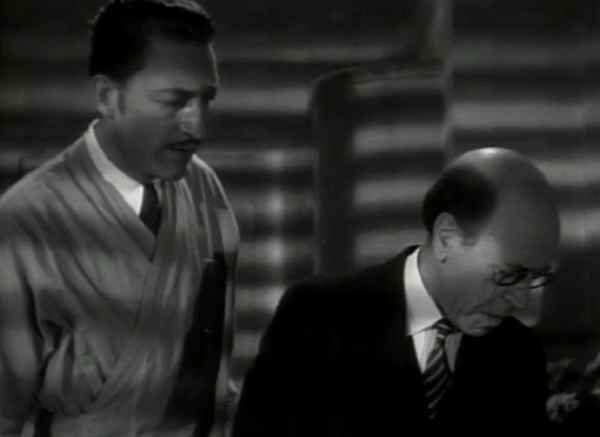
Does this seem ominous? I can never tell.
Bedside is another Warner Brothers film about the power of appearances, like Union Depot or The Gold Diggers of 1933. In its worldview, everyone’s a con, and the key to success is finding a smooth line of malarkey and riding it to the bank. This sort of nihilism can have a certain appeal when it’s cheerful, but Bedside constantly manages to feel bleak. With its possibly-horrific sidestepping into addiction and death and horribly tacked on ending, it feels like less of a message than a shrug. The film’s sub-current about the dangers of unchecked male sexual desire are equally unapologetically unexciting.
It’s impossible to talk about this movie without relating it to one of its Warner Brothers bretheren film, Alias the Doctor. That movie takes much of the same tact of a man who’s unqualified for his medical practice, though that one sees Richard Barthelmess as a brilliant surgeon who must live a lie. Where Alias assures the audience that the good are those who suffer but still succeed despite the odds, Bedside is about how a good woman’ll get any bad man back on the path of righteousness. Bedside is the better of the two pictures, but it’s an interesting dichotomy from two movies from the same studio only a year apart.
End spoilers.
Bedside is an okay movie that suffers in comparison to a lot of movies of its time. Only its treatment of a morphine addict really sets it apart from the pack, but it still can’t compensate for an over familiar Warren William role and a truly unsympathetic female lead. For a movie about the medical profession, Bedside sure seems to be missing its pulse.
Gallery
Hover over for controls.
Trivia & Links
- Andre Sennwald in the Times sounds like he feels about the same as me on this one:
Actually the story of “Bedside” is not quite as predictable a thing as it sounds, but its deviations from the formula are too wild-eyed to be classed as dramatic virtues. […] It is all pretty furious stuff, examined coldly, and the behavior of the fake physician is a good deal too cold-blooded to win much sympathy from the audience.
- Cliff Aliperti at WarrenWilliam.Com is much more up on this one. He explains:
What follows has obviously been placed under budgetary constraints of the studio, but survives and even more, thrives on story, character and especially the performances of Warren William and David Landau. Jean Muir has little more to do than be female, which is about as much as she puts into Caroline. Jenkins is competent as usual, but there’s nothing special about his press agent Sparks.
No, “Bedside” is pretty much all the Warren William show, which for fans, such as myself, is a great delight. It’s little gems such as “Bedside” which make us wonder how William, featured in films as big as “Lady for a Day” (1933), “Cleopatra” (1934), and even “The Wolf Man” (1941), besides playing the screen’s first Perry Mason and several other popular roles, can be so forgotten.
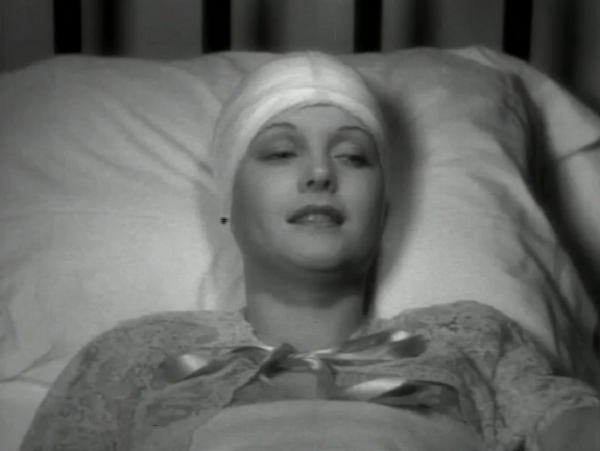
“DUHHHH WE LOVE NOW?”
- Dawn’s Noir and Chick Flicks uses the occasion of the movie to discuss the mostly-Broadway-bound life of Jean Muir.
- Meanwhile, TCMDB talks about the life and career of director Robert Florey:
As for Robert Florey, he is best known among horror aficionados for such memorable genre entries as Murders in the Rue Morgue (1932), The Face Behind the Mask (1941) and The Beast with Five Fingers (1946). Although he spent most of his movie career toiling in the Warner Bros. B-movie unit, turning out efficient programmers like Bedside, he transitioned into the television industry in the early fifties where his talent was finally recognized; he earned an Emmy Award nomination (The Loretta Young Show) and five Directors Guild of America nominations before his death in 1979.
- At one point Allen Jenkins intones, “You’re not only a doctor, you’re a mind reader!” Funny, since Jenkins and William costarred in The Mind Reader together the year before.
Awards, Accolades & Availability
- As of this review, Bedside was available to rent over at Warner Archive Instant.
Comment below or join our email subscription list on the sidebar! |
||
 |
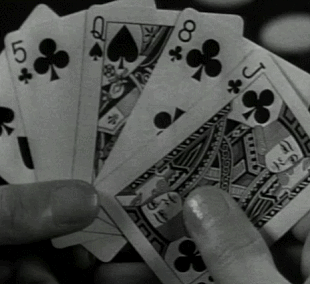 |
 |
 |
 |
|

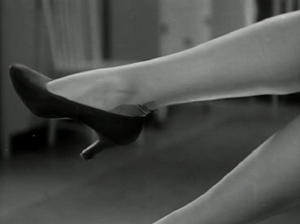



2 Comments
Cliff Aliperti · October 17, 2014 at 4:21 am
Ouch, I’d have rather seen you hate it than be indifferent.
I know it’s not a great movie, and it might even be a bad movie, but it’s still one of my all-time favorite hours around. I know that I bemoan the Code coming along and neutering Warren’s whole career, but it may have actually done him a favor considering this one with Smarty on top a few months later—how far would the next script have pushed his character?
I don’t see this as a recycle as much as I see it as Warren at his absolutely most dastardly. Oh, it’s not at all believable, but then once Donald Meek touts himself the next Dr. Frankenstein, that facade kind of drops anyway. (By the way, for a much better made movie with Warren as a doctor, hunt down 1937s Outcast, also directed by Robert Florey).
Glad you at least enjoyed David Landau, I thought he was very good too, and I think we agree about Jean Muir being handed an absolutely terrible character. Louise Beavers, yeah, they just shouldn’t have gone there, but then that’s one of the least surprising aspects of Bedside.
With some years of reflection since I’ve fist seen it, I’d probably say Bedside ranks for me as a guilty-pleasure, the way horror or sci-fi fans love some of the greatest schlock from those genres. But every time I watch it, it’s audacity shocks me all over again, and I come away loving it anew.
One of those pre-Code titles, of which there are several, that I watch and just can’t believe it was made. I’m surprised you see it as a recycle, because I find it unique in that regard. It’s not often that an hour can make you wonder what the hell just happened so many times! The story may suck and the characters are reprehensible (like pre-Code porn to me), but the incidents are, well, audacious.
Is it good? I like it. Is it bad? Okay, I can see your point. Indifference disappoints me.
PS: Good catch on the “Mind Reader” comment at the end. I’ve actually noticed this in a few of Warren’s pre-Codes. In fact, I think there’s a reference to a mouthpiece in The Mind Reader, and I recall it happening another couple of times, but I never took time to mark them down.
PPS: Thanks for the link, always appreciated!
Danny · October 29, 2014 at 3:13 pm
I honestly think that if I hadn’t seen Alias the Doctor, I might not have had as much of a negative reaction. I just didn’t get the feeling that anything very original was going outside of the ‘resurrecting the dead’ angle, and that was barely explored. I wish the movie had been more weird, but c’est la vie.
And there are definitely lots of references between Warren William movies. I think in Upperworld he drives by a billboard for Goodbye Again, which is pretty cheeky. If you ever get bored, I’d love to see a list of those connections.
Comments are closed.